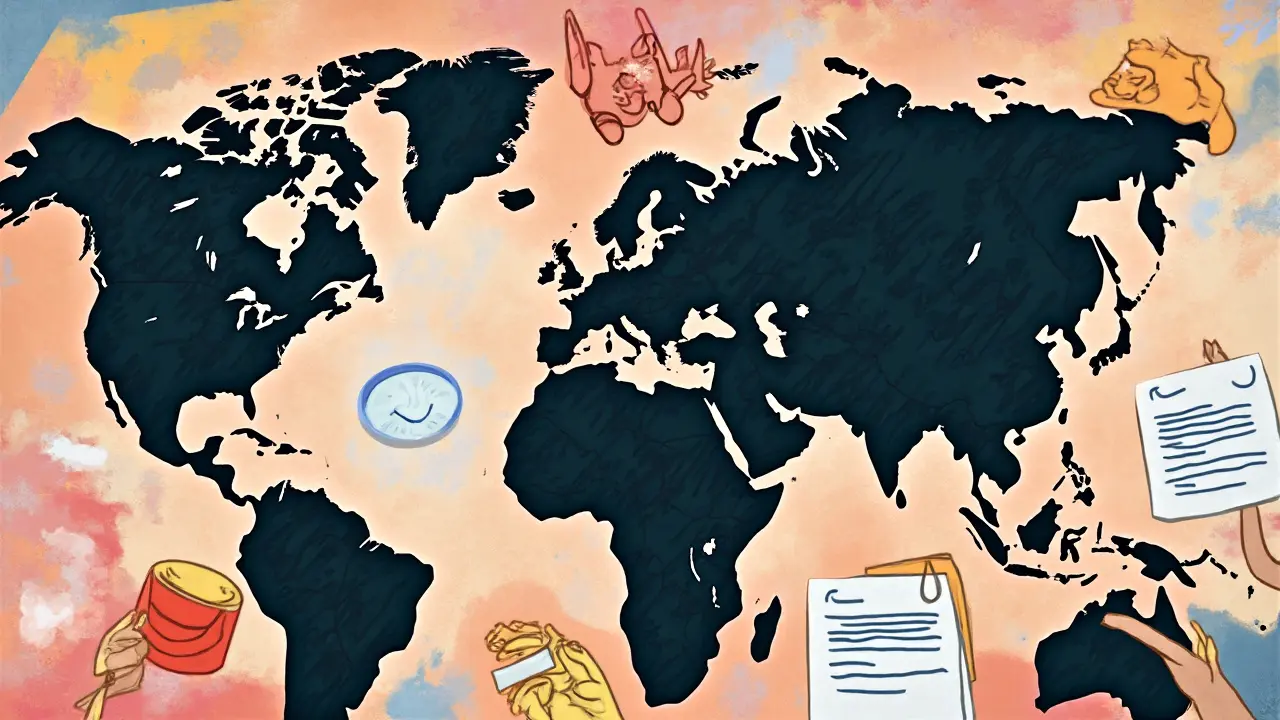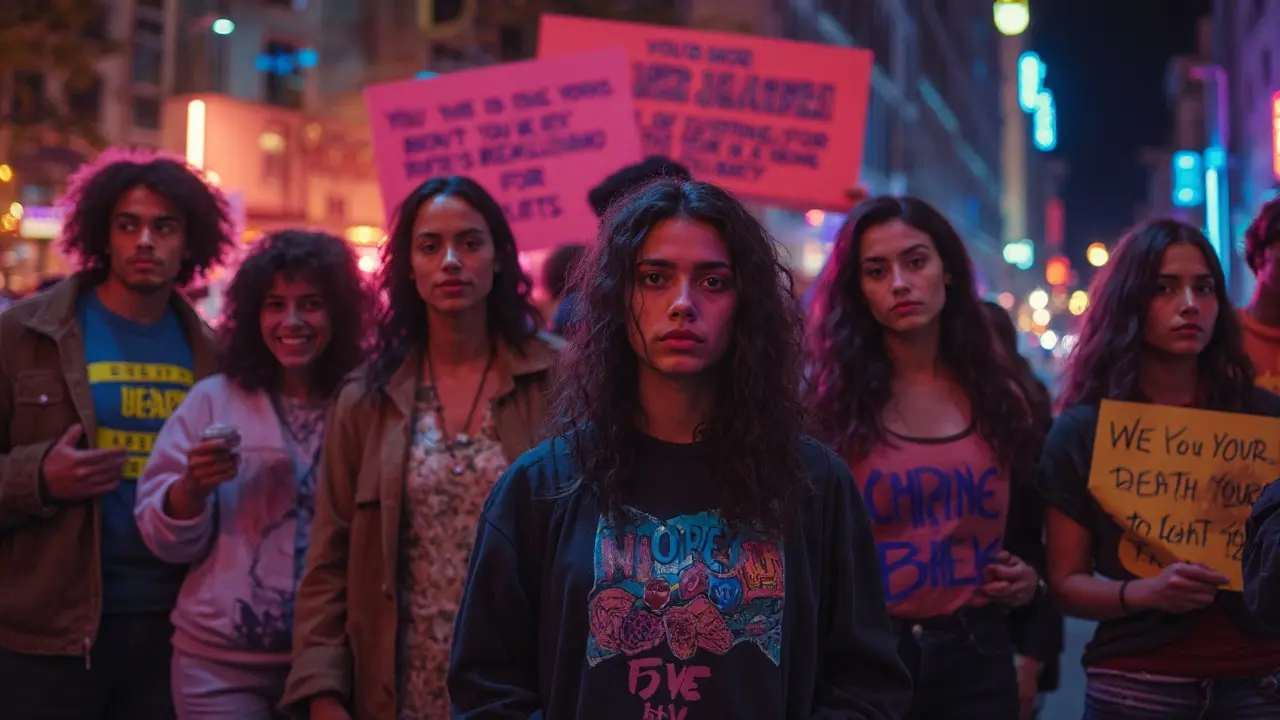One day a year, the world wakes up to the sticky truth about sex work: safety and health in this industry isn't a side note—it's the headline. Yet, only when red lights turn to signals for action do most realize the dangers aren’t always between the sheets. They lurk in shadowy alleyways, in legal codes, and behind that quiet stigma nobody wants to talk about in polite company.
The Double Life of Danger: Between Law and Libido
First, let's get naked about the reality. Sex work—be it in a neon-lit brothel, behind a cam in some tiny city apartment, or in the discreet corners of a five-star hotel—isn't the problem. The real danger is how laws, judgment, and a total lack of worker protections force people to take risks they'd never choose if given a safer option. Sex workers aren’t a monolith; they're parents, students, caretakers, and hustlers juggling two worlds—one with public faces and one that's pressed up tight against closed doors.
That closed-door policy has real-life costs. Criminalization pushes sex work underground. Sure, a few countries have tried the Nordic Model, where buyers get the tickets and sellers walk free, but research from Amnesty International in 2016 found that even there, things aren’t as rosy as they seem. When clients are chased off the streets but workers still need rent money, desperation breeds riskier business. Legal crackdowns often mean people screen clients less, move faster, and ignore gut instincts—anything to keep the cash flow coming in what’s suddenly become riskier territory. Add to that police harassment, legal double binds, and the constant threat of violence, and it’s easy to see why some nights feel more like Russian roulette than a rendezvous.
Even worse, health isn’t just about condoms or catching an STI. Studies out of the Global Network of Sex Work Projects reveal the mental toll is crushing—rates of PTSD and depression among sex workers far outstrip most other professions. Why? The constant dance with stigma. Don’t forget, this stress isn’t just about personal shame—it bleeds into clinics, doctor’s offices, and every attempt to access basic healthcare. Many turn away or just lie, leaving symptoms to fester behind a painted smile.
But let’s get specific. In countries where sex work is illegal or semi-legal, sex workers report assault rates anywhere from 45% to 75%. In contrast, places that decriminalize or fully legalize—New Zealand is a shining example—see drastic drops in violence, and workers have no trouble reporting crimes, seeking health care, or insisting on safe practices. One 2019 study from the University of Otago found that sex workers post-decriminalization saw a tangible increase in condom negotiation and use; real talk, that means fewer STIs, fewer pregnancies, more control.
This isn’t an argument for utopia. The flip side to acceptance brings new headaches—like unscrupulous brothel owners or exploitation in the name of legitimacy—but the raw numbers show a tradeoff worth considering. The World Health Organization now circles decriminalization on their lists of ways to slow HIV trends and cut back on violence in the industry. If only lawmakers had the same hunger for facts as for moral outrage.

Outsmarting Risk: Innovations and Survival Strategies
You’d be shocked how creative sex workers get when society looks the other way. With cops, clients, and old-fashioned shame breathing down their necks, this industry cooks up harm reduction strategies that would make any Fortune 500 boss jealous. Don't imagine a seedy underworld of shadows and gritted teeth—think tech-savvy community organizers, peer educators, and networks so tight-knit that word-of-mouth is both life raft and lifeline.
Let’s get into details. Mobile apps designed by and for sex workers allow them to rate clients, flag abusive behavior, and share real-time alerts about police sweeps or violent customers. Some of these apps even use GPS and ‘panic button’ features, which notify networks if there's an emergency. In London, the National Ugly Mugs project has slashed reports of serious incidents just by sharing tips and info. Just imagine how that kind of network would change the game if everyone had open access, without the boot of the law threatening to stomp on them for using it.
But tech isn’t everything. Community empowerment comes in latex and lube, too. Grassroots organizations distribute safer-sex kits, arrange for mobile STI testing, and put word out about doctors who won’t rat you out. Sex worker-led trainings—often run out of anonymous basements or pop-up booths—teach everything from improvising a barrier with a sandwich bag (yes, really!) to negotiating condom use with stubborn clients who bring fat wallets and bigger egos.
Data from UNAIDS reveals these interventions work. When sex workers get condoms, lube, and medical info in nonjudgmental settings, HIV transmission drops by up to 50%. Now, let’s spice it up with a bit of economics: a 2022 cost-benefit analysis in Thailand found that every $1 spent on community-led sex worker programming saves $7 in healthcare costs and lost productivity. Talk about an ROI that’ll make you bite your lip.
Housing support, mental-health aid, even financial self-defense—sex worker collectives are leading the way. Workshops teach folks to recognize red flags, build an exit plan from violent scenarios, and source backup without blowing their cover. It’s all about building resilience when no one else will. International Sex Workers’ Day events have started featuring everything from self-defense demos to ‘taxes 101’ for freelancers. Kinks are part of the package, and mastering self-care moves—both mental and physical—is just as essential as mastering the Kama Sutra.

Changing the Game: Law, Advocacy, and the Future of Health
The future of sex worker safety isn’t just about latex gloves or legal loopholes—it’s about creating horny, happy consent culture where safety is as sexy as anything else on the menu. There’s a new breed of organizers kicking shame to the curb and pushing governments to use facts, not fear, to guide policy. Think global, act local—groups like SWOP-USA, Scarlet Alliance in Australia, and the Asia Pacific Network of Sex Workers aren’t just protesting; they’re policy architects, lobbying for sex worker safety as a human right rather than a legislative afterthought.
The numbers are eye opening. Twelve countries have full or partial decriminalization on the books, and new research from Decriminalize Sex Work documented a 27% drop in reported violent incidents wherever worker-led organizations partner with local health services. When France flirted with full legalization, STI rates dropped and health checks soared. Everywhere stigma is slashed, workers get bolder—filing police reports, refusing unsafe work, demanding respectful treatment from health providers. Informal health clinics staffed by peer advocates are popping up in cities from Cape Town to Toronto, bridging gaps for those still living double lives.
Advocacy goes digital now, too: hashtags like #RightsNotRescue and #DecrimNow trend every May 2, reminding us that protection starts with visibility. Webinars, TikTok explainers, and underground podcasts have become tools for rallying allies and educating a public far more curious (and kinky) than lawmakers dare to admit.
But here’s a hot fact: the real impact comes when non-sex workers tune in and make noise alongside the industry. Healthy alliances are forming with LGBTQ+ rights groups, anti-violence campaigners, and forward-thinking health organizations. Surprise—when unions and health orgs join the fray, resources multiply. Prejudice shrinks. Cries for decriminalization get louder, and lawmakers have nowhere left to hide behind nervous smirks or moral panic.
So, what does a world built for safer sex workers look like? It’s written in bolder legislation, free HIV testing on every street corner, respectful clinics, and police who protect, not persecute, every body—no matter who gets naked and when. Which brings us here: you, reading, and the thousands who still work in fear. Take a stand. Talk about it. Vote for lawmakers who see sex workers as neighbors, not nuisances. Support harm reduction programs, donate to local advocacy, share those red umbrella campaigns on your most vanilla social feed. Open your mouth for safer pleasure everywhere, because safety—for bodies, hearts, and fantasies—should never be a dirty secret.




